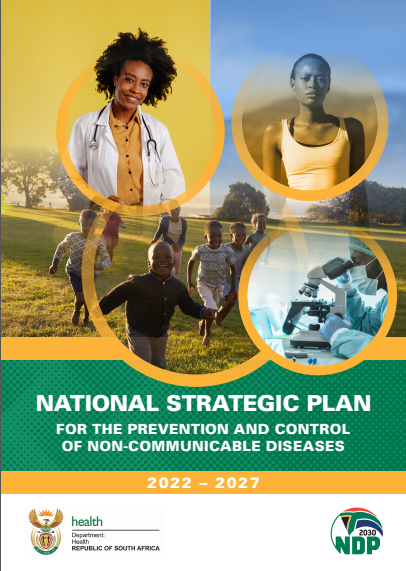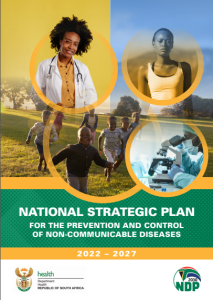
 Celebration time. It’s happening on 31 May 2022 in Somerset East, Eastern Cape, as part of a World No Tobacco Day event. At last, the NCDs+ civil society can breathe a collective sigh of relief. IT is the long-awaited National Department of Health’s (NDOH) NCDs+ policy for 5 years until 2027. The about-to-launched plan is a compromise, but it is way better than the early drafts. As Churchill may have said, “we are at the end of the beginning”.
Celebration time. It’s happening on 31 May 2022 in Somerset East, Eastern Cape, as part of a World No Tobacco Day event. At last, the NCDs+ civil society can breathe a collective sigh of relief. IT is the long-awaited National Department of Health’s (NDOH) NCDs+ policy for 5 years until 2027. The about-to-launched plan is a compromise, but it is way better than the early drafts. As Churchill may have said, “we are at the end of the beginning”.
If the SANCDA+ had left the NDoH decision makers to their own devices, the 3rd NCDs+ National Strategic Plan (NSP) would have been done and dusted in 2019 without credible transparency and authored mainly by a WHO Country Office appointed contractor. And that version looked remarkably similar to the previous failed 2nd NCDs plan 2013-2017. That plan wasn’t funded, implemented and only externally reviewed/evaluated in 2021.
Yes, it is the SANCDA+ activism that put a spanner in the works. Our early enthusiastic cooperation soured as it became clear that the plan would never be implemented or funded. It moved the SANCDA+ from advocacy to activism using similar tactics as HIV activists in the early part of this century. Memories are short but what is good for the goose is good for the gander.
What is different about the 3rd NCDs+ NSP? (more…)
NCDs are being “integrated” into vertical the HIV/AIDS programme at primary health care clinics with little or  no consultation with patients. Read what is being done in the UK and how the same matter is being handled in South Africa.
no consultation with patients. Read what is being done in the UK and how the same matter is being handled in South Africa.
Are you a person living with an NCD?
How do you think we are doing in South Africa in the public and private sectors?
The principles for integrated care (most relevant below) are based on patients (aka service users). Read what UK patients want from integrated health care.
- Organised around the needs of individuals (person-centred)
- Focus always on the goal of benefiting service users
- Be evaluated by its outcomes, especially those which service users themselves report
- Include community and voluntary sector contributions (NGOs and similar organisations)
- Be fully inclusive of all communities in the locality
- Be designed together with the users of services and their carers
- Deliver a new deal for people with long term conditions
- Respond to carers as well as the people they are caring for
- Aim to achieve public and social value, not just to save money
- Last over time and be allowed to experiment
In South Africa two documents form the conceptual basis for NCDs integration: the Integrated Chronic Disease Model (ICDM) and Primary Care 101.
The ICDM
“…is a new model to improve the quality of care and outcomes for patients with chronic disease. The ICDM integrates chronic disease care at primary clinics for patients with both communicable and non-communicable conditions, and is also aligned to the PHC re-engineering Framework.
The ICDM engages stakeholders at multiple levels to strengthen the quality of care provided at clinics , to assist individuals to assume responsibility for their health, and for communities to participate in screening and health promotion activities.”
PC 101
Primary Care 101 (PC 101) is a symptom-based integrated clinical management guideline for the management of common symptoms and chronic conditions in adults.
The guidelines are intended to be used by all health care practitioners working at primary care level in South Africa.
PC 101 is being implemented as part of the Integrated Chronic Disease Model (ICDM
Click here to view ICDM
Click here to view PC 101
What do you think?

 Celebration time. It’s happening on 31 May 2022 in Somerset East, Eastern Cape, as part of a World No Tobacco Day event. At last, the NCDs+ civil society can breathe a collective sigh of relief. IT is the long-awaited National Department of Health’s (NDOH) NCDs+ policy for 5 years until 2027. The about-to-launched plan is a compromise, but it is way better than the early drafts. As Churchill may have said, “we are at the end of the beginning”.
Celebration time. It’s happening on 31 May 2022 in Somerset East, Eastern Cape, as part of a World No Tobacco Day event. At last, the NCDs+ civil society can breathe a collective sigh of relief. IT is the long-awaited National Department of Health’s (NDOH) NCDs+ policy for 5 years until 2027. The about-to-launched plan is a compromise, but it is way better than the early drafts. As Churchill may have said, “we are at the end of the beginning”.
 no consultation with patients. Read what is being done in the UK and how the same matter is being handled in South Africa.
no consultation with patients. Read what is being done in the UK and how the same matter is being handled in South Africa.